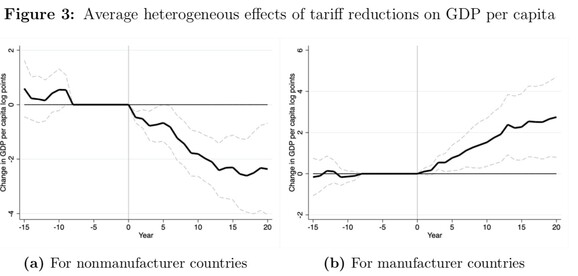Is free trade really good for growth? Is it good for both industrialized and non-industrialized countries? Although the profession would lean towards saying that free trade is always good for growth, for all types of countries, my job market paper shows that free trade has actually been detrimental for growth in non-industrialized countries and only beneficial for industrialized ones . Take a look here: https://mathoyosgit.github.io/mathoyos/jmp_current.pdf
#econtwitter #econjobmarket
@mathoyos Seems really interesting, I will definitely have a check.
@mathoyos what was the impact of free trade on different classes of workers?
@mathoyos This paper will be fun. This question has haunted me since my undergrad teacher Immanuel Wallerstein decided to take on comparative advantage in his 'Modern World System'. I've always concluded his point about 'unequal trade' was true only if some additional norm or consideration was introduced to Ricardo's (admittedly unrealistic) set of assumptions, but I'm always looking for new takes.
@tbarson49 very glad you may find it fun. So mine is purely empirical, but a recent modern theoretical take (with a bit of empirics too) would be found in this one: https://www.nber.org/papers/w29500
@mathoyos A prominent name in your references, @drodrik , lectured just yesterday on structural mix aspect of this issue. https://steg.cepr.org/events/steg-special-lecture-2022
@tbarson49 @drodrik yep, attended it, and also interpret my results as suggestive that premature deindustrialization in the developing world was indeed due to globalization, as he argued :). Not sure if I’ll get a job, but at least he already reboogged my paper :D
@mathoyos @drodrik
His "framework" had me thinking all day and, yes, a quick glance suggests your data can fit within the general scheme. Glancing at Atkin et al, I'm struck by how difficult it is to characterize the "bottom of the ladder," where there are simply too many problems for failure on one measure to have a single cause.
Meanwhile, good luck with your search!
@tbarson49 @drodrik that’s right. Thanks again! :)
@mathoyos Differential returns from free trade was of course a common sense insight shared by some scholars and political leaders two centuries ago, as presented in Helleiner's book "The Neomercantilists: A Global Intellectual History ". The most famous one is Friedrich List, but many others critiqued the axiom that was becoming established around the mid-1800s.
https://www.cornellpress.cornell.edu/book/9781501760129/the-neomercantilists/#bookTabs=1
@RoyCobby thanks for this. there is indeed a long tradition arguing free trade might negatively affect development, but the arguments have been usually rejected by the mainstream. There’s this new paper that takes it up again, which I really liked and hope gets more diffusion as deserved: https://www.nber.org/papers/w29500
@mathoyos Thanks, will check it out!

